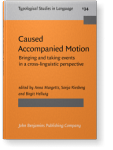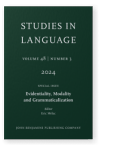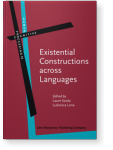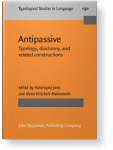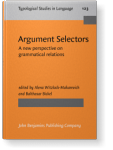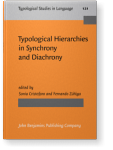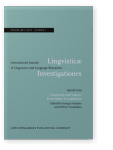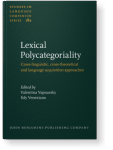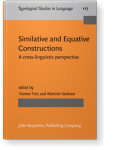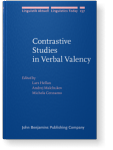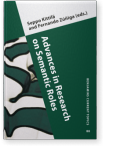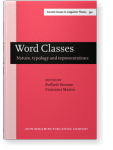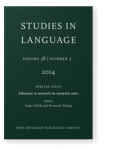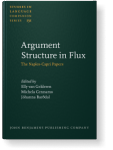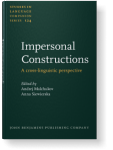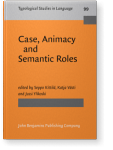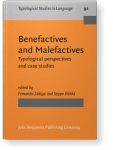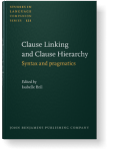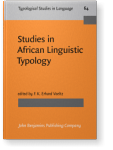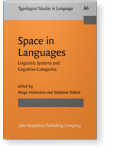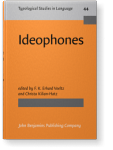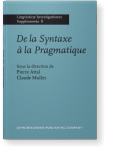Denis Creissels
List of John Benjamins publications for which Denis Creissels plays a role.
Book series
Journal
ISSN 0378-4177 | E-ISSN 1569-9978
2023 Chapter 2. Existential predication and have-possessive constructions in the languages of the world Existential Constructions across Languages: Forms, meanings and functions, Sarda, Laure and Ludovica Lena (eds.), pp. 34–67 | Chapter
The present article deals with the relationship between have-possessive constructions and inverse-locational predication, a type of construction commonly characterized as ‘existential’, illustrated by English There is a cat in the tree (contrasting with the plain-locational clause The cat is in… read more
2021 Chapter 9. Antipassive derivation in Soninke (West Mande) Antipassive: Typology, diachrony, and related constructions, Janic, Katarzyna and Alena Witzlack-Makarevich (eds.), pp. 293–314 | Chapter
Soninke, a West Mande language spoken in Mali, Mauritania, Gambia, and Senegal, provides crucial support to the view that accusative languages may have fully productive antipassive derivations. In Soninke, the distinction between transitive and intransitive predication is particularly clearcut.… read more
2019 Grammatical relations in Mandinka Argument Selectors: A new perspective on grammatical relations, Witzlack-Makarevich, Alena and Balthasar Bickel (eds.), pp. 301–348 | Chapter
In this paper, after establishing on a strictly language-internal basis the distinction between four possible syntactic positions for arguments in Mandinka predicative constructions, and analyzing alignment relationships in the coding properties of arguments, I discuss alignment in the syntactic… read more
2018 Chapter 2. The Obligatory Coding Principle in diachronic perspective Typological Hierarchies in Synchrony and Diachrony, Cristofaro, Sonia and Fernando Zúñiga (eds.), pp. 59–110 | Chapter
The Obligatory Coding Principle accounts for the inventories of possible coding frames in languages that, according to the current terminology, can be characterized as consistently accusative or consistently ergative in their system of argument coding. In coding frame inventories fully consistent… read more
2017 Transitivity and valency in Northern Akhvakh Transitivity and Valency: From theory to acquisition, Fotiadou, Georgia and Hélène Vassiliadou (eds.), pp. 81–116 | Article
This paper analyzes transitivity and valency in Northern Akhvakh, a language belonging to the Andic group of languages included in the Northeast Caucasian (or Nakh-Daghestanian) family. Northern Akhvakh clause structure is characterized by an extreme flexibility of constituent order,… read more
2017 The flexibility of the noun/verb distinction in the lexicon of Mandinka Lexical Polycategoriality: Cross-linguistic, cross-theoretical and language acquisition approaches, Vapnarsky, Valentina and Edy Veneziano (eds.), pp. 35–57 | Chapter
In Mandinka, a Mande language, it is easy to identify words fulfilling the function of verbal head of a clause or nominal head of a noun phrase, but the division of lexemes into a class of nominal lexemes and a class of verbal lexemes is problematic, due to their categorial flexibility. This… read more
2017 Chapter 3. Similarity, suitability, and non-epistemic modalities (volitionality, ability, and obligation) Similative and Equative Constructions: A cross-linguistic perspective, Treis, Yvonne and Martine Vanhove (eds.), pp. 79–90 | Chapter
This article shows that verbs expressing similarity between two entities are not only found in constructions expressing the kind of epistemic modality expressed in English by means of the verbseem, but may also be involved in polysemy patterns including the expression of other types of modalities… read more
2017 Non-canonical valency patterns in Basque, variation and evolution Contrastive Studies in Verbal Valency, Hellan, Lars, Andrej L. Malchukov and Michela Cennamo (eds.), pp. 151–174 | Chapter
In Standard Basque and in most present-day dialects, coding frames that were exceptional in Old Basque are attested by a sizeable proportion of the verbal lexicon, which results in a system characterized by a typologically uncommon type of split intransitivity. In this paper, we… read more
2016 Functive phrases in typological and diachronic perspective Advances in Research on Semantic Roles, Kittilä, Seppo and Fernando Zúñiga (eds.), pp. 173–215 | Article
This chapter is concerned with a particular semantic type of noun phrases in secondary predicate function, illustrated by as a negotiator in He was sent as a negotiator. It explores the cross-linguistic regularities in the polysemy patterns characteristic of the markers and constructions having the… read more
2014 The ‘new adjectives’ of Tswana Word Classes: Nature, typology and representations, Simone, Raffaele and Francesca Masini (eds.), pp. 75–94 | Article
In addition to a class of adjectives inherited from Proto-Bantu, characterized by a set of class agreement prefixes identical to the class prefixes of nouns, Tswana has words expressing meanings of the type commonly expressed by adjectives. These occur in the same syntactic positions as the words… read more
2014 Functive phrases in typological and diachronic perspective Advances in research on semantic roles, Kittilä, Seppo and Fernando Zúñiga (eds.), pp. 605–647 | Article
This paper is concerned with a particular semantic type of noun phrases in secondary predicate function, illustrated by as a negotiator in He was sent as a negotiator. It explores the cross-linguistic regularities in the polysemy patterns characteristic of the markers and constructions having the… read more
2013 Control and the evolution of possessive and existential constructions Argument Structure in Flux: The Naples-Capri Papers, Gelderen, Elly van, Jóhanna Barðdal and Michela Cennamo (eds.), pp. 461–476 | Article
This paper examines aspects of the evolution of possessive and existential constructions that shed interesting light on the affinities between possession and the notions underlying existential predication, comitative predication and transitive predication. The unity of the notion of possession… read more
2013 Floating genitives and possessive framing in Northern Akhvakh The Genitive, Carlier, Anne and Jean-Christophe Verstraete (eds.), pp. 333–354 | Article
This paper analyzes a construction involving genitives in Northern Akhvakh, the floating genitive construction. In this construction, a genitive NP is related to a noun in S or P role but is not included in the NP headed by this noun. The floating genitive identifies the personal sphere of its… read more
2011 Impersonal constructions in Jóola-Banjal Impersonal Constructions: A cross-linguistic perspective, Malchukov, Andrej L. and Anna Siewierska (eds.), pp. 285–306 | Article
Jóola-Banjal (an Atlantic language spoken in Senegal) has several constructions, not mentioned in previous works on Jóola languages, which include no canonical subject. This paper puts forward a formal classification of these constructions and a description of their functions, emphasizing the… read more
2011 Animacy and spatial cases: Typological tendencies, and the case of Basque Case, Animacy and Semantic Roles, Kittilä, Seppo, Katja Västi and Jussi Ylikoski (eds.), pp. 157–182 | Article
In the expression of spatial relationships, it is cross-linguistically common that human or animate nouns have particularities that distinguish them from other nouns. After presenting cross-linguistic data illustrating some tendencies observed in the behavior of human or animate nouns in spatial… read more
2010 Benefactive applicative periphrases: A typological approach Benefactives and Malefactives: Typological perspectives and case studies, Zúñiga, Fernando and Seppo Kittilä (eds.), pp. 29–70 | Article
After defining applicative periphrases as constructions in which a verb (the verb-operator) acts as a valency operator licensing the expression of an additional participant fulfilling a given semantic role in the event encoded by another verb (the lexical verb), this paper analyses applicative… read more
2010 Specialized converbs and adverbial subordination in Axaxdәrә Akhvakh Clause Linking and Clause Hierarchy: Syntax and pragmatics, Bril, Isabelle (ed.), pp. 105–142 | Article
Northern Akhvakh, like other Nakh-Daghestanian languages, has a large inventory of converbs specialized in the expression of various semantic types of adverbial subordination: locative, temporal, conditional, concessive, similative, gradual, and purposive. After outlining the general… read more
2006 A typology of subject and object markers in African languages Studies in African Linguistic Typology, Voeltz, F.K. Erhard (ed.), pp. 43–70 | Article
2006 Encoding the distinction between location, source, and destination: A typological study Space in Languages: Linguistic Systems and Cognitive Categories, Hickmann, Maya † and Stéphane Robert (eds.), pp. 19–28 | Article
2001 Setswana ideophones as uninflected predicative lexemes Ideophones, Voeltz, F.K. Erhard and Christa Kilian-Hatz (eds.), pp. 75–85 | Article
1984 Le rapport entre prédication associative et détermination associative: syntaxe ou sémantique? De la Syntaxe à la Pragmatique: Actes du Colloque de Rennes, Université de Haute-Bretagne, Attal, Pierre et Claude Muller (dir.), pp. 63 ff. | Article
